

EDITORIAL: The Great Firewall of China. When it comes to the Internet, the People's Republic of China (PRC) would rather be safe than sorry.

Beijing is taking new steps to make certain the social networking-fueled contagion of freedom that is sweeping the Arab world will not penetrate mainland China’s great firewall. Rather than risk another Tiananmen Square uprising, the communist government is mobilizing to ensure that spontaneous stirrings of liberty won’t take root among its 1.3 billion people. On May 4, Beijing announced the formation of the State Internet Information Office, which centralizes the duties of a dozen other government agencies to rationalize the system and promote “healthy development” in Chinese cyberspace.
Officially, the office will secure “the people’s right to know, to participate, to express and to supervise,” but in practice it will be a one-stop shop for content control and censorship in the Middle Kingdom. Maoists have reason to fear freedom. Activists rally to give ACTA the cold shoulder. Thousands of internet users have taken part in protests around Europe against an international anti-piracy agreement.

Campaigners believe the Anti-Counterfeiting Trade Agreement, or ACTA, will curb their freedom to download movies and music for free and encourage Internet surveillance. They gathered in sub-zero temperatures in towns and cities across the continent. The pact aims to cut trademark theft and tackle other online offences. Acta: Europe braced for protests over anti-piracy treaty. EP debates petitions against ACTA. Anti-Counterfeiting Trade Agreement ACTA has left few people indifferent.

22 Countries in the EU Signed ACTA and Why That's Bad. Remember how the Internet finally “killed” SOPA and PIPA?
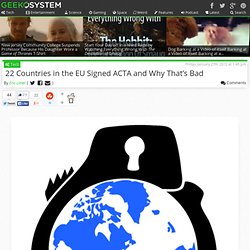
Remember how people said they might come back? Well, they haven’t but they have a cousin called ACTA that’s stirring up similar trouble of a global kind. I know we all want to rest on our laurels for a while, but until digital media is well understood and accepted by rights holders (read: A long time from now) there are no victories. Acta protests: Thousands take to streets across Europe. 11 February 2012Last updated at 13:57 ET By Dave Lee Technology Reporter Marchers in London gathered outside British Music House, home to several major rights holders Thousands of people have taken part in co-ordinated protests across Europe in opposition to a controversial anti-piracy agreement.
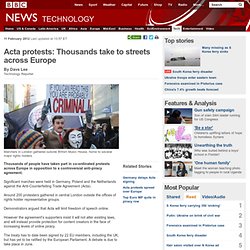
Online petition against PIPA and SOPA threatening internet freedom currently at 943,207 signatures. The Senate vote is soon. This petition will be read out name by name by Senator Wyden to filibuster these acts. Right now, Congress is debating a law that would give them the power to censor the world’s Internet — creating a blacklist that could target YouTube, WikiLeaks and even groups like Avaaz!
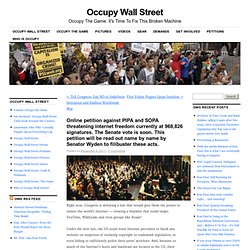
Under the new law, the US could force Internet providers to block any website on suspicion of violating copyright or trademark legislation, or even failing to sufficiently police their users’ activities. And, because so much of the Internet’s hosts and hardware are located in the US, their blacklist would clamp down on the free web for all of us. The vote could happen at any time now, but we can help stop this — champions in Congress want to preserve free speech and tell us that a global outcry would strengthen their hand, and one of them — Senator Wyden — says he will “filibuster” or block any vote on the bill by reading out our petition names until the clock runs out!
Protests against SOPA and PIPA. A screenshot of the English Wikipedia landing page, symbolically its only page during the blackout on January 18, 2012.
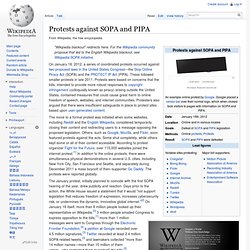
(A dynamic version of the page can be seen at en.wikipedia.org/? Banner=blackout, though the "Congress lookup" feature no longer works.) On January 18, 2012, a series of coordinated protests occurred against two proposed laws in the United States Congress—the Stop Online Piracy Act (SOPA) and the PROTECT IP Act (PIPA). These followed smaller protests in late 2011.
Protests were based on concerns that the bills, intended to provide more robust responses to copyright infringement (colloquially known as piracy) arising outside the United States, contained measures that could cause great harm to online freedom of speech, websites, and internet communities. The January protest, initially planned to coincide with the first SOPA hearing of the year, drew publicity and reaction. By January 20, 2012, the political environment regarding both bills had shifted significantly. World Wide Web. The World Wide Web (abbreviated as WWW or W3,[3] commonly known as the web) is a system of interlinked hypertext documents accessed via the Internet.
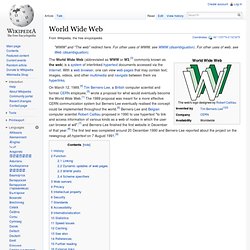
With a web browser, one can view web pages that may contain text, images, videos, and other multimedia and navigate between them via hyperlinks. History[edit] In the May 1970 issue of Popular Science magazine, Arthur C. History of the World Wide Web. The World Wide Web ("WWW" or simply the "Web") is a global information medium which users can read and write via computers connected to the Internet.
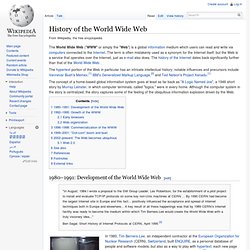
The term is often mistakenly used as a synonym for the Internet itself, but the Web is a service that operates over the Internet, just as e-mail also does. The history of the Internet dates back significantly further than that of the World Wide Web. The hypertext portion of the Web in particular has an intricate intellectual history; notable influences and precursors include Vannevar Bush's Memex,[1] IBM's Generalized Markup Language,[2] and Ted Nelson's Project Xanadu.[1] The concept of a home-based global information system goes at least as far back as "A Logic Named Joe", a 1946 short story by Murray Leinster, in which computer terminals, called "logics," were in every home.